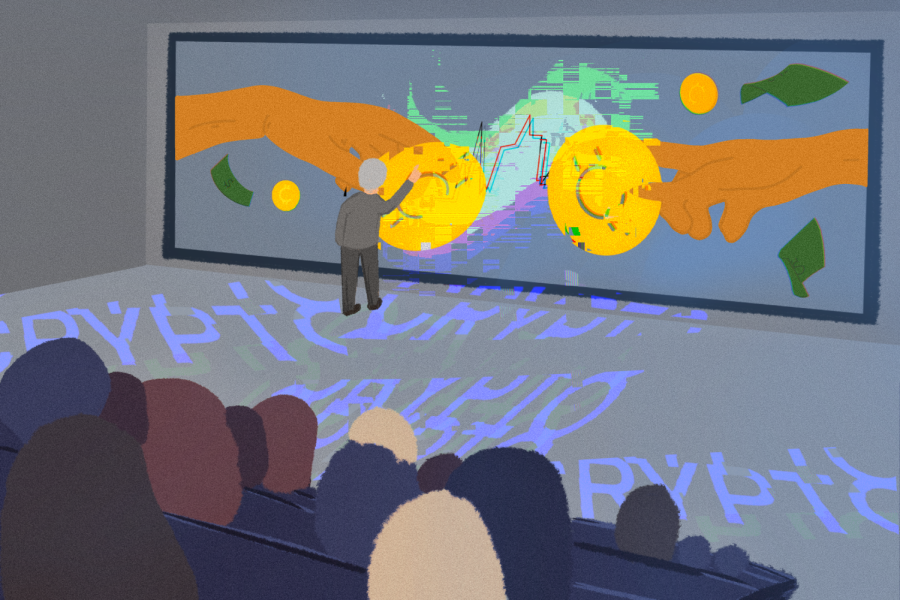Point Counterpoint: Offer students cryptocurrency seminars
March 31, 2022
In its simplest form, cryptocurrency is a digital medium of exchange that users can buy, sell, or use to transact in other ways.
Some believe cryptocurrency is a passing financial fad that has little to no value. Others see cryptocurrency as the medium of exchange of the future. While people tend to have strong opinions regarding crypto, many, including students at UT, might not feel they have enough information to form their own opinion on the matter. The University should provide students a foundation they can use to expand their knowledge regarding crypto.
In order to provide students of all majors an equal opportunity to learn and form their own opinions on cryptocurrency, the University should hold crypto education seminars throughout the school year.
While there are courses and initiatives at the University intended to help students understand the complexities surrounding crypto and its digital counterparts, they aren’t as accessible as they should be.
Since crypto is highly technical in nature, the ways in which people can benefit is often glossed over. However, cryptocurrency has played a significant role in democratizing money.
For instance, some donations are being made for global humanitarian causes through crypto. People may opt to send money through crypto instead of transferring funds through a traditional bank because crypto reportedly transfers funds at a much more efficient rate and at a lower cost than traditional bank fund transfers.
Computer science junior Antonio Gonzalez expressed interest in the idea of UT holding cryptocurrency seminars.
“Given how crypto has gained a lot of popularity throughout the years, it’s only going to keep getting more popular,” Gonzalez said. “Having a resource like the University, educating their students on what it is, that would be very helpful.”
While the University has done a good job helping finance and STEM students stay ahead of the technology curve, opportunities aimed at helping all students learn about current and future crypto-related innovations are limited. It’s vital that everyone feels they have a chance to gain a general understanding of digital currency.
Gonzalez further explained some of the reasons the University should encourage students of all backgrounds and majors to learn about the basics and general importance of cryptocurrency.
“(Cryptocurrency) can have a lot of human benefits: it’s extremely important right now, it’s been advertised everywhere and it’s not going to go away,” Gonzalez said. “I just don’t see a..argument against (cryptocurrency seminars).”
The proposed seminars would be held on campus throughout the year, where guest speakers such as professors and blockchain professionals would discuss topics such as the basic properties of cryptocurrency as well as its real world applications. Students of all majors could attend the seminars and learn about crypto on their own time, instead of becoming a member of a student organization or adding an entire course in their already busy semester.
Cesare Fracassi, associate professor in the Department of Finance and director of the University’s Blockchain Initiative, explained his thoughts on the University offering cryptocurrency education seminars.
“If you’re an undergrad student, there is the Texas Blockchain, which is a student organization on campus,” Fracassi said. “I’m personally running a crypto lab where I actually bring in speakers almost every week, but that’s actually more exclusive.”
Due to the emergence of crypto and its utility, nothing about blockchain technology or cryptocurrency education should be exclusive.
While Texas Blockchain is a good educational resource, students without the necessary technical knowledge might not be as willing to engage with this type of resource. Additionally, students might not have enough time throughout the school year to commit to being members of the organization.
The University-wide seminar structure resolves all of these issues.
While there are credible points on both sides of the cryptocurrency argument, a good University doesn’t teach its students what to think: it teaches them how to think. Irrespective of major or career path, students must be given more chances to learn about one of the world’s leading financial innovations through seminars held by the University.
Through these opportunities, students can acquire tools that can help them lead more financially and technologically informed lives, and ultimately help them draw their own conclusions regarding cryptocurrency.
Lazenby is an economics junior from Chicago, Illinois.











